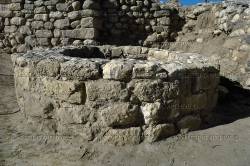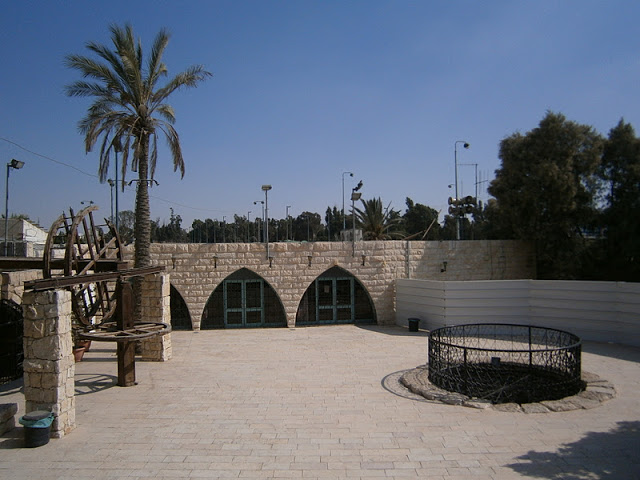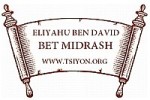The Good Way

Now all the wells which his father's servants had dug in the days of Abraham his father, the Philistines stopped up by filling them with earth ..Then Isaac dug again the wells of water which had been dug in the days of his father Abraham, for the Philistines had stopped them up after the death of Abraham; and he gave them the same names which his father had given them.
Gen 26:15-18
Listen FREE this Sabbath
- Tsiyon Road Sabbath broadcasting begins
Tue, April 2, 6 PM, Jerusalem time, and continues for 48 hours. The Midrash is broadcast 8 times over that period. Listen to this radio presentation free at that time!
|

Use
any mobile device! |
|
Tsiyon News
 Tsiyon
Road is on Glorystar Satellite! Tsiyon
Road is on Glorystar Satellite!
If you don't
already own equipment Glorystar has made an equipment package
available just for Tsiyon Road listeners. With this equipment you
can enjoy Tsiyon Road, as well as 70+ other TV and radio channels. There aren't any
monthly fees or service charges beyond the initial purchase and
installation of the equipment. If you ever experience problems,
staff is available in English or Spanish to help. Glorystar provides
service and support to Canada and the USA. To find out more visit
our special Tsiyon Road page:
http://tsiyon.glorystar.tv/
Tsiyon Road
Glorystar channel 1013
Galaxy 19
Frequency: 11836
MHz (V)
Symbol Rate: 20.770
 Slovakian
Translation at Tsiyon - Our Tsiyon Partners in
Slovakia have kindly provided us content in Slovakian, now available
from our Tsiyon.org website. This is very helpful, not only for
Slovakian visitors, but visitors reading other Eastern European
languages as well, including Russian, can also read Slovakian.
Thanks a bunch, Katka! Slovakian
Translation at Tsiyon - Our Tsiyon Partners in
Slovakia have kindly provided us content in Slovakian, now available
from our Tsiyon.org website. This is very helpful, not only for
Slovakian visitors, but visitors reading other Eastern European
languages as well, including Russian, can also read Slovakian.
Thanks a bunch, Katka!
 Abraham's
Well -
Beersheba is the largest city in the Negev desert of southern Israel
and is often referred to as the "Capital of the Negev." Abraham's
Well -
Beersheba is the largest city in the Negev desert of southern Israel
and is often referred to as the "Capital of the Negev."
Modern Beersheba is a city on the rise. It is home to the main
campus of Ben-Gurion University of the Negev and many high-tech
companies are headquartered in the region. There are construction
cranes in use across the city and the Jewish National Fund's
Blueprint Negev Project is helping fund new projects including an
eco-friendly riverfront district, and of course, new shopping malls.
A new visitor center
is constructed at Abraham's Well. This is believed to be the place
that Abraham dug a well and made an oath of non-aggression with
Abimelech - the leader of the Philistines. Isaac later reopened the
well and renewed the pact. Beersheba (Well of the Oath) is named
after the pact. The well has been prettied up a bit for the visitor
center and now the site includes a new feature that Abraham and
Isaac might well have enjoyed - namely, a Domino's Pizza
literally right next to Abraham's Well.
Abraham, Isaac and
Jacob - Real People
Listener Contributed - A hundred years ago, many
Bible critics claimed that stories of the patriarchs
were nothing more than religious fiction. The
“silence of history” concerning the patriarchs, upon
which these critics based their claims, was
shattered with the discovery of ancient tablets at
Mari (in southeast Syria) and Nuzi (in modern-day
Iraq).
These
tablets, although not directly mentioning the
patriarchs, still constituted such valuable
testimony about their life-styles that the late
Professor William F. Albright (the then-acknowledged
“dean” of Palestinian archaeologists) concluded that
“the narratives of Genesis dealing with Abram may
now be integrated into the life and history of the
time [the second millennium B.C.] in such
surprisingly consistent ways that there can be
little doubt about their substantial historicity” (Biblical
Archaeologist, July 1973, p. 10). Professor
Albright’s conclusion was based on the following
evidence from the Mari and Nuzi tablets:
-
Names like Abraham and Jacob were in common use
among the Amorites in northern Mesopotamia about
2000 B.C. and later.
-
Mari was the center of a vast network of trade
routes ranging from Crete to Elam, from
Cappadocia to Megiddo. Merchants constantly
traveled these routes from one end to the other.
Seen in this context, Abraham’s journey from Ur
to Haran, then to Canaan and Egypt, is not as
improbable as the critics once thought.
-
Abraham’s relationship with Hagar (Genesis 16)
and Jacob’s with Bilhah (Genesis 30) can be
better understood by a comparison with a
marriage contract from Nuzi, in which the wife
was required, if she proved to be barren, to
provide a substitute for her husband.
-
Abraham’s reluctance to drive out Hagar and
Ishmael (Genesis 16:6) is understandable in the
light of Nuzi customs governing such
relationships.
-
Another Nuzi tablet revealed the adoption by a
childless couple of a servant born in their
house. He became the heir if he cared for them
in their old age (see Genesis 15:2-3).
-
Jacob’s relationship with Laban (Genesis 29)
becomes more understandable when compared to
other tablets from Nuzi.
Overall, the patriarchs’ way of life conforms so
closely to the cultural world described by these
tablets that there is no reason to doubt that they
were real people.
Need to talk to us? - In the USA and Canada just call us toll
free at (888) 230-2440 for help. Internationally, email us and we
will arrange a phone or Skype call for you.
From Eliyahu
This Sabbath is the last day of the Feast of Unleavened Bread, a
time when Israel remembers the hasty Exodus of our forefathers from
Egypt. This feast, as with much of our spiritual heritage, depends
upon remembering and reestablishing the ancient paths of our
fathers. Our latest Midrash looks at how Isaac reestablished the
paths of his father, Abraham, and in doing so, left a pattern for
all of us to follow. There is much to think about in this
discussion, that I believe you will find to be very timely on this
last day of Unleavened Bread, year 6013.
Blessings and
Shalom!
Eliyahu ben David
www.tsiyon.org
|
©2013 Tsiyon A130-425,
5701 W Slaughter LN, Austin, TX, USA, 78749
Please make offering
checks to: "Tsiyon."
You may leave feedback,
prayer requests and donations online
here. |









 Tsiyon
Road is on Glorystar Satellite!
Tsiyon
Road is on Glorystar Satellite!

 Abraham's
Well -
Beersheba is the largest city in the Negev desert of southern Israel
and is often referred to as the "Capital of the Negev."
Abraham's
Well -
Beersheba is the largest city in the Negev desert of southern Israel
and is often referred to as the "Capital of the Negev."